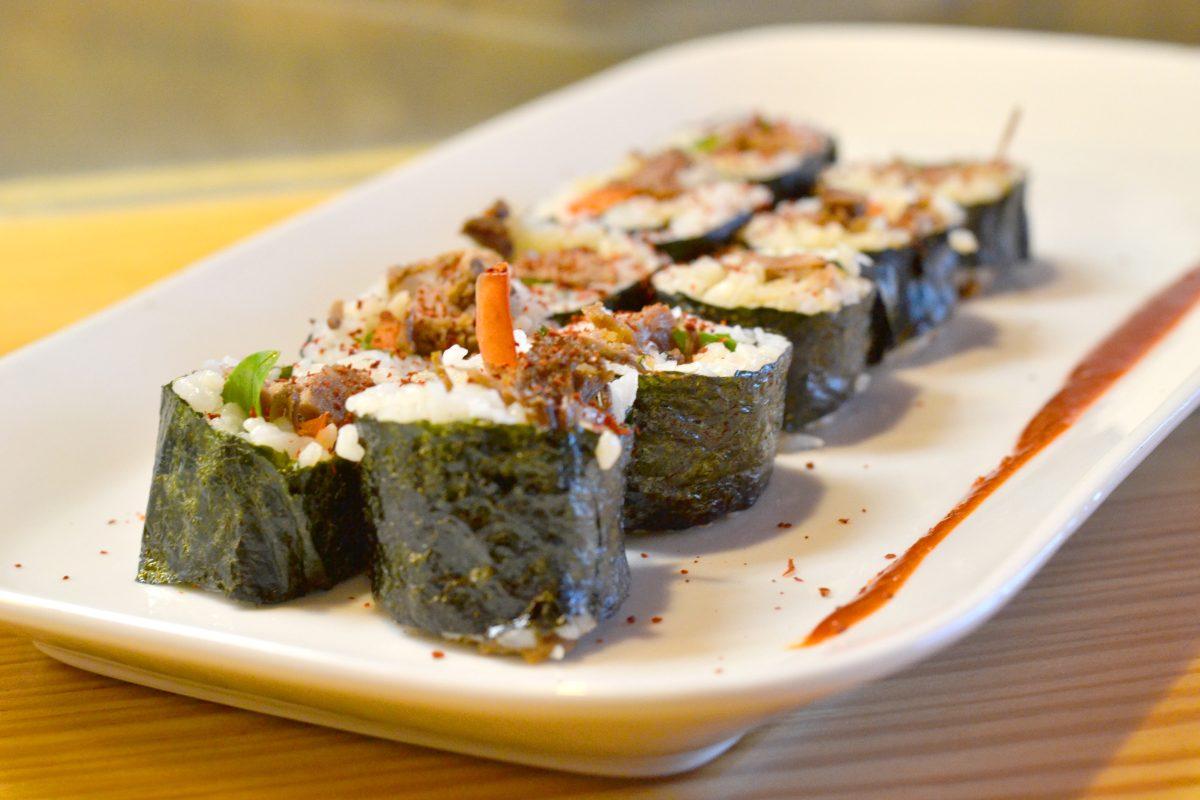White rice, bulgogi, takuan, spinach, carrots and odeng all wrapped in roasted seaweed are all it takes to make the Korean version of sushi known as kimbap.
Kim Hunter, owner of Kimbap Café, had never thought of breaking into the restaurant business, but found her niche creating traditional Korean cuisine with a twist. Hunter’s form of kimbap includes steamed white rice along with various ingredients, rolled in dried laver seaweed sliced into bite-sized pieces. It was the inspiration behind the name and creation of the company.
“I was selling Kimbap roll at one of the markets and everyone loved the name,” Hunter said. “They said it was because my name is Kim, they found it clever. I would hear things like ‘Oh, this is a Kimbap roll, that’s so cute!’ It really seemed to resonate with the group that I was working with that I started to rethink the name…it fit.”
So with a love for food and an appetite for local ingredients, Hunter left her manager position at the Western Wake Farmers Market to create a restaurant all her own. “This is my first restaurant,” Hunter said. “I’ve done a little work with restaurants but this hasn’t been a lifelong career of mine. I just knew that this was a move I wanted to make.” She opened Kimbap Café in correlation with the First Friday event in March.
“I was very excited but I also had moments of extreme anxiety. It was everything from ‘What if people don’t like it?’ to ‘What if I’m not good at this?’” However, according to Hunter customers already seem to have favorites. Kimbap’s pork dumplings and bulgogi are just two of the dishes that are ordered every evening. “Sometimes I’m so heads down in the kitchen that I realize I should look up more. Now that our staff is better trained I’m able to get out of the kitchen and talk to the customers.”
Describing her menu as “scrumptiously sustainable,” Hunter explained that dishes are adapted as the seasons and products available change. The menu features several different kinds of Korean dumplings, stews and hot pots known as jjigae, fresh rolls which include shrimp or braised pork, and the classic kimbap.
“I’m always researching and playing around with recipes that are very Korean. Sometimes people that come in are looking for down-home Korean. I’ve heard a few say, ‘Oh, this dish is not exactly what I’m used to or was expecting.’ Then there are others that will say, ‘Wow, the freshness is amazing.’”
According to Hunter, Kimbap also serves their Korean dishes with only local products. Hunter said that it was the connections she made with local farmers that helped develop her knack for using fresh and homegrown goods.
“There’s a locality to the whole dynamic. We have partnerships with many local farmers. Large food distributers have come by several times to try and set up an account with us and we deny them every time. We don’t have any accounts with any of the large distributors. We buy all of our meat, all of our fish and most of our veggies from local farms.”
Explaining her desire to find only the best products, Hunter stressed the idea that just because something is homegrown doesn’t mean it’s been grown in a pure and healthy way. “It’s not only local – it’s beyond local. I love down-home Korean food from other restaurants but ours is incredibly fresh, which is something you might not necessarily find at other places.”
Although Hunter has no background in restaurants, she is confident in the ability of the Kimbap Café to grow and thrive. “We’re committed to our cause. It’s something we really believe in and that makes anything stronger.”








